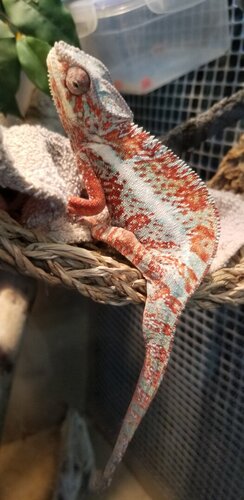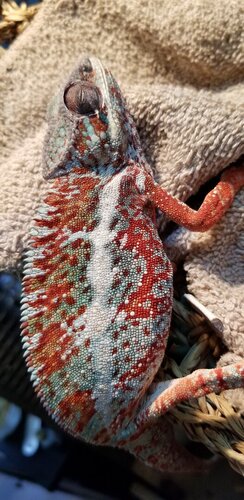sonia
Member
Hi everyone
This comes with a very heavy heart, so please no negativity as I feel a world of emotions and sorrow, regret and madness.
I have a panther cham. He is about 1 year old. He is small and unwell but the vet can't help me figure it out.
I am finally of the opinion that I would rehome him to a professional in Hope's of giving him a chance for life.
He hardly eats, hardly drinks, and yes I do provide both food and water.
He is small, half the size he should be, the vet thinks maybe he just wasnt meant to grow big.
He keeps one of his eyes closed often and I've given him a drop provided by the vet, and it worked so I stopped and were back to closed eye.
The biggest issue is that he just doesnt eat. We try crickets, mealworms. Wax worms and we have provided horn worms. Nothing. He eats once in a blue moon but he should be eating more. I just feel like I'm failing him.
I'm located in guelph/hamilton/milton area and think he is better off with someone who has more experience and time than I do, but I also wont be just comfortable handing him over to anyone as I do care about him. I want to know he is going to someone who will try whatever they can.
Again this is not what I want, or intended but am only doing what I think may be best for him.
This comes with a very heavy heart, so please no negativity as I feel a world of emotions and sorrow, regret and madness.
I have a panther cham. He is about 1 year old. He is small and unwell but the vet can't help me figure it out.
I am finally of the opinion that I would rehome him to a professional in Hope's of giving him a chance for life.
He hardly eats, hardly drinks, and yes I do provide both food and water.
He is small, half the size he should be, the vet thinks maybe he just wasnt meant to grow big.
He keeps one of his eyes closed often and I've given him a drop provided by the vet, and it worked so I stopped and were back to closed eye.
The biggest issue is that he just doesnt eat. We try crickets, mealworms. Wax worms and we have provided horn worms. Nothing. He eats once in a blue moon but he should be eating more. I just feel like I'm failing him.
I'm located in guelph/hamilton/milton area and think he is better off with someone who has more experience and time than I do, but I also wont be just comfortable handing him over to anyone as I do care about him. I want to know he is going to someone who will try whatever they can.
Again this is not what I want, or intended but am only doing what I think may be best for him.







